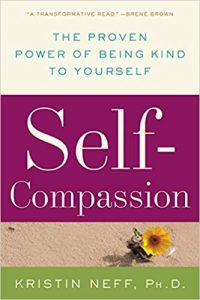 As one who has had a lot of problems with self-esteem and self-worth as a result of depression, I’ve been interested to find out about the work of Kristin Neff. She is a psychologist who has presented self-compassion as an alternate way of thinking about the self.
As one who has had a lot of problems with self-esteem and self-worth as a result of depression, I’ve been interested to find out about the work of Kristin Neff. She is a psychologist who has presented self-compassion as an alternate way of thinking about the self.
The idea of self-esteem has been pretty basic to the way we think of ourselves. Poor self-esteem is one of the hallmarks of depression for most people, and positive self-esteem is considered to be one of the key elements of psychological well-being.
Neff’s book Self-Compassion: The Proven Power of Being Kind to Yourself points out a few problems with the use of self-esteem as a primary criterion for gauging mental and emotional wellness.
Limits of Self-Esteem
Self-esteem concerns your own evaluation of how well you do things. It can become your primary measure of self-worth and determine the way you feel about yourself. The problem arises when people feel their self-esteem rising and falling in response to how successful they believe they are.
Our culture is brutal when it comes to success and separates the winners and losers with lightening speed. The Olympics often offer examples. Champion athletes wearing silver medals are often in tears and lashing themselves because they believed they had let everyone down by failing to win the gold, failing to be number one. As far as some of these champions are concerned, for the rest of their lives they may never be able to overcome the self-stigma of failure as human beings.
The emphasis on self-esteem can also lead people to evaluate their own talents at the expense of others. Comparisons become crucial. If they feel they can do better, they may regard others with an attitude of superiority and contempt. If they disparage their own accomplishments, they may see the abilities of others as confirming their own inferiority and worthlessness.
They have unrealistic assessments of their strengths and weaknesses based on these comparisons. Often, they need to feel superior to others in order to feel good about themselves.
Neff believes that, while self-esteem can be positive and healthy, there are other qualities that tend to count for more in well-being than the way you evaluate yourself. She summarizes these qualities as self-compassion.
Self-Compassion is Not Self-Indulgence
I have to admit that the idea of self-compassion has been a hard sell for me, largely because of the confusions about it that Neff tries to correct. I’ve equated it with an artificial affirmation of the type so common from superficial presentations of positive thinking. Somehow if you keep repeating mantras about loving kindness toward yourself or keep in mind a lot of self-affirmations you will enhance your self-worth. I have never found those practices to be very helpful.
I’ve also linked self-compassion with an idea of expecting less of yourself, attempting less taxing activities, trying to live on an even keel, facing the world with an untested equanimity. I’ve thought of that approach as a cloak over the hard realities of living.
I know that’s an unfair assessment, one that has helped me avoid dealing with the intractable problems with self-regard and self-worth. Neff offers a framework to think more clearly about these ideas.
A Definition of Self-Compassion
For her, self-compassion consists of three intertwining dimensions.
Self-kindness, or the tendency to be understanding and tolerant of ourselves rather than harshly critical and judgmental. We talk to ourselves with support rather than contempt and can respond to our inadequacies in a concerned and balanced way.
The sense of common humanity links us to a shared experience of life, including its pain and suffering. It recognizes that failures, mistakes and feelings of inadequacy are qualities shared by all people and not shortcomings uniquely defining our lack of human value. Instead of isolating us in a personal sense of failure, it helps link us to the rest of the world as another imperfect human being, one to be treated with the same care and concern we would show to our families and friends.
Mindfulness, meaning in this context the ability to see our successes and failures in an accepting and balanced way. In particular, mindfulness keeps us from over-identifying with failures and mistakes, or “fusing,” as it’s put in Acceptance and Commitment Therapy. In mindful awareness, you are attentive to everything you’re experiencing but neither ignore painful problems nor obsess about them.
This may sound familiar, and it is derived from Buddhist principles. But what sets Neff’s work apart is her reliance on research about the behavior of people who are self-compassionate in contrast to those who rely on self-esteem in the way they regard themselves.
Research Contrasting Self-Esteem and Self-Compassion
According to a series of studies, self-compassionate people show greater personal initiative in making necessary changes in their lives, including career changes. Unlike people whose primary motive is to protect or enhance self-esteem, the self-compassionate push themselves forward because of the intrinsic interest in what they pursue, not because it will help them feel better about themselves. That’s exactly the opposite of what I had always assumed.
Self-compassion, as Neff puts it, “is available precisely when self-esteem fails us – when we fall flat on our face, embarrass ourselves, or otherwise come in direct contact with the imperfection of life.”
Neff also says that a self based on compassion rather than esteem shows more resilience when we have to confront our mistakes and weaknesses.
Research traces the differences between these two ways of regarding oneself to different neurological systems in the brain. High self-esteem tends to trigger the impulse and reward system associated with the neurotransmitter, dopamine. Strong self-compassion, on the other hand, activates the hormones that settle the system following periods of stress and danger. It stimulates the system that gives us a sense of safety and security.
Further, self-esteem is based on demonstrating skill and accomplishment, successes which depend in part on the evaluation of others as well as on the belief that we are respected for the abilities we have shown. If what we think of ourselves depends primarily on self-esteem, our self-regard becomes dependent on externals rather than an intrinsic sense of self-worth.
Self-Compassion as a Way of Relating to Yourself
Self-compassion is not about achievement or evaluation. It’s a way of relating to oneself. Perhaps for that reason, it is associated in research with greater stability of self-worth.
These comparisons can make it seem that Neff is characterizing esteem and compassion as mutually exclusive ways of regarding the self. Of course, they’re not. Healthy self-esteem and a good sense of self-compassion are both characteristics of psychological well-being. Her point is that a positive sense of self – so sorely lacking in depression – involves a lot more than self-evaluation.
Research also brings out a problem. It appears that those of us who grew up with overly critical mothers, lived in dysfunctional families and developed insecure ways of relating to people have an injured sense of self-worth that is resistant to change. We have a lot more depression, stress and anxiety than others and a hard time either raising self-esteem or detaching enough from our self-condemnation to feel real compassion for ourselves.
That sounds painfully familiar, but there are ways of learning to be more self-compassionate and improving the sense of self-worth. Jon Kabat-Zinn’s stress reduction training helps, and Neff and her colleagues, particularly Christopher Germer, have been developing new forms of therapy specifically focused on self-compassion .
Editor’s Note: This is a revised version of an email-only newsletter from the archives.


